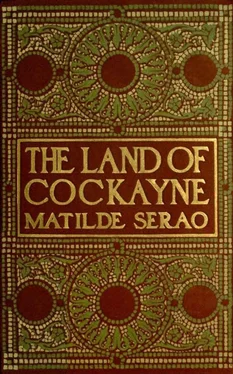Matilde Serao - The Land of Cockayne
Здесь есть возможность читать онлайн «Matilde Serao - The Land of Cockayne» — ознакомительный отрывок электронной книги совершенно бесплатно, а после прочтения отрывка купить полную версию. В некоторых случаях можно слушать аудио, скачать через торрент в формате fb2 и присутствует краткое содержание. Жанр: unrecognised, на английском языке. Описание произведения, (предисловие) а так же отзывы посетителей доступны на портале библиотеки ЛибКат.
- Название:The Land of Cockayne
- Автор:
- Жанр:
- Год:неизвестен
- ISBN:нет данных
- Рейтинг книги:3 / 5. Голосов: 1
-
Избранное:Добавить в избранное
- Отзывы:
-
Ваша оценка:
- 60
- 1
- 2
- 3
- 4
- 5
The Land of Cockayne: краткое содержание, описание и аннотация
Предлагаем к чтению аннотацию, описание, краткое содержание или предисловие (зависит от того, что написал сам автор книги «The Land of Cockayne»). Если вы не нашли необходимую информацию о книге — напишите в комментариях, мы постараемся отыскать её.
The Land of Cockayne — читать онлайн ознакомительный отрывок
Ниже представлен текст книги, разбитый по страницам. Система сохранения места последней прочитанной страницы, позволяет с удобством читать онлайн бесплатно книгу «The Land of Cockayne», без необходимости каждый раз заново искать на чём Вы остановились. Поставьте закладку, и сможете в любой момент перейти на страницу, на которой закончили чтение.
Интервал:
Закладка:
As Don Gennaro Parascandolo had persuaded his poor shadow to leave the shade that evening, he was quite lively; whilst Luisella led the signora to the divan of honour, he went about, followed by Cesare, joking and laughing; all made a chorus to him wherever he passed, with that tendency to worship riches that all, and Southerners in particular, are apt to have. The Naddeos, Antonaccis, Durantes, and Fragalàs were rich people; but things may change in this world from one day to another. And Don Gennaro was so rich he really did not know what to do with his money! As to the little people in the room—clerks, tradesmen, managers—they looked respectfully at him from afar, impressed by his broad shoulders, deep chest, and leonine head. His name was whispered here and there, with comments in a lower voice: 'Don Gennaro Parascandolo.'
But Cesare and Luisella seemed to get an electric shock when the third person they were waiting for arrived. She was an old lady, who came forward solemnly, in a very old maroon silk, stiff as a board, made in the fashion of thirty years before, with organ-pipe pleats and very wide sleeves. She wore a black lace shawl that was very old, too, fastened with a turquoise and ruby brooch, black lace mittens on her old, withered hands, that clutched a black velvet bag worked in point stitch—on one side a little dog on a cushion, a peasant woman with a broad straw hat on the other. Luisella, pulling up her train, ran to meet her, made a deep curtsy, and stooped to kiss the hand that the old woman held out; she had an old coquette's peevish expression, with round gray eyes and a drooping nose. Another whisper went through the room: 'The godmother, the Marchioness.' No one said she was the Marchioness of Castelforte; she was the godmother—that was all. There was only one Marchioness godmother in the Fragalà family; she was Luisella's godmother and patron, a lady respected and feared by the whole connection—in short, a Marchioness, a titled person, of superior race. Even Don Parascandolo, who had no need of anyone, as all knew, went to bow before her, while the old woman closely examined him.
Now there was no more room on the seat of honour. Luisella sat in the middle, the Marchioness on her right, and Signora Parascandolo on her left, in Parisian costume, covered with magnificent jewels, but bowing her head under the weight of remembrances, always and unfailingly. As all got seated, there was perfect silence for two minutes. All were waiting, still looking at the door furtively, pretending to think about something else. Ladies hid a little yawn behind their fans; girls had that sleep-walking look that makes them seem detached from all human interests; men twirled their moustaches; and the boys had that absolutely idiotic look of which Fofò Mayer was the highest exponent.
But Cesare Fragalà disappeared. Refreshments came in two minutes after that silence. Then all set to talking, loudly, noisily, to have an easy bearing, pretending not to care for refreshments. But they came in from all sides continuously, spreading through the room, to the delight of all who longed for sweets—men and women, boys and girls. To ices thick and round as a full moon, so hard the teaspoon had to be pressed down, followed Portuguese cream, fruit, strawberries, white and Levant coffee, chocolate; smaller ices of all shapes, prettily arranged in pink or blue glass shells with gold rims; sponges—half cream and half ice, of different flavours: chocolate, mandarin punch, pistachio, strawberries and cream, honey and milk. After sponge-cakes, the delight of women and boys, followed peach and almond tarts, and coffee and lemon ices, served in milky white porcelain glasses. For ten minutes nothing was heard but the rattling of plates, spoons, and glasses; but when the ladies saw the trifles coming, they cried out enthusiastically about their lovely colours, with the white foam in the middle, and held out their hands involuntarily, whilst others, quieter and more active, ate up one thing after the other to compare them.
Conversation got animated with such joy. Gentlemen ran here and there, fetching a plate or glass, serving the ladies and themselves too, speaking from a distance, asking questions, calling up the waiters with the trays, making them lose their heads in the confusion.
'A sponge-cake for Signora Naddeo.'
'Would you like an almond tart?'
'Take a glass of champagne punch. There is nothing better for digesting the rest.'
'Who will change a strawberry ice for a coffee ice?'
'I assure you it comes to nothing, after all; the ices are water really. What shall it be—strawberries?'
'I have one.'
'Mama, give me the cream.'
Quite pleased, Cesare ran from one side to the other, leading the waiters, as every tray came up, towards the Marchioness, who was always the first to take some. Signora Parascandolo was the next; but she hardly took a spoonful, when she put down her plate and cast down her eyes again distractedly, as if she neither saw nor heard what was going on around her. The Marchioness, on the other hand, without hurrying, ate slowly of everything with her fallen-in mouth and toothless gums, her jaw going continually and her hooked nose trembling over her upper lip.
'My lady, try this pistachio. Would you like mandarin better, my lady?'
She nodded 'Yes,' like an old Chinese idol. Her withered hands had let go the bag, after taking a big white handkerchief out of it to put under her plate.
Very happy, Luisella tossed her head, laughing at all that cheerful noise. Every now and then her husband stopped before her.
'Won't you take something?'
'No, no! Help the other ladies.'
'Take something, Luisella.'
'No; I like looking on better.'
The view all around was so interesting! The ladies, who were more affected in their greed, sipped the sherbet delicately, keeping the plate on the point of their gloved fingers, raising the little finger every time they put in the spoon, keeping a lace handkerchief on their knees, and biting their lips after each spoonful. Some men quietly followed the waiter's tray step by step, so as to make a good choice, after which they went into a corner to eat comfortably. Little children put their ices on a chair, covering themselves with cream up to their eyes, and stuck out their pink lips, their innocent eyes showing their delight as they slowly licked the spoon; whilst the sleepy-headed-looking girls refused this and that, and ended by taking a little of everything, leaving the half of it, not really fond of eating yet. Even the Mayer family had got over their misanthropy; the lady thought no more of her neuralgia, and Don Domenico hesitated between a sponge and an ice, whilst Amalia and Fofò exchanged ices, to get the taste of each.
In the other rooms, everywhere, in the passages, even in the cook's bedroom and the kitchen, the same jingling of glasses and spoons went on, and the joy was even greater. The servants from every floor in the Rossi Palace had run in. The porter came up; the hair-dresser returned; the nurse's husband, the Naddeos' and the Antonaccis' coachmen—for they kept carriages—came in; even the newspaper boy of the Tarsia corner and the postman, still in uniform from his last round, with letter-bag round his neck, stood beside Gelsomina and Donna Candida. All these humble common folk that love sweets and sherbet had a feast, by the master's orders, and he came out every now and then to the kitchen, delighted to see them enjoy themselves. He replied to the servants' congratulations, speaking to them familiarly in dialect.
Now there spread a feeling of gastronomic repose; people quieted down, got a composed look, and smiled happily after the first burst of gourmandizing. Conversation, languid at first, had taken the mild tone of quiet, easy people, full of good breeding. The ladies smiled slightly; the girls waved their fans; men set mild discussions agoing solemnly—about their affairs, about the small politics of the day, the stagnant state of trade, from which all suffered. They stood in groups, gesticulating and solemnly nodding.
Читать дальшеИнтервал:
Закладка:
Похожие книги на «The Land of Cockayne»
Представляем Вашему вниманию похожие книги на «The Land of Cockayne» списком для выбора. Мы отобрали схожую по названию и смыслу литературу в надежде предоставить читателям больше вариантов отыскать новые, интересные, ещё непрочитанные произведения.
Обсуждение, отзывы о книге «The Land of Cockayne» и просто собственные мнения читателей. Оставьте ваши комментарии, напишите, что Вы думаете о произведении, его смысле или главных героях. Укажите что конкретно понравилось, а что нет, и почему Вы так считаете.












